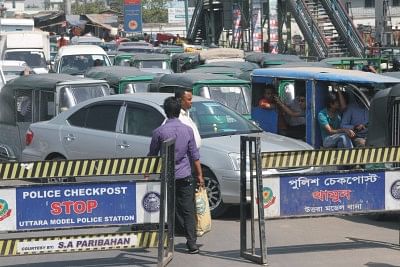Of 19 directives and 11 conditions

Photo: S.k. Enamul Haq
We are happy to see March 12 pass off without any major incident. And the AL leaders may have slept more peacefully that night with the misplaced euphoria of having been able to frustrate, albeit partly, the BNP's programme. The rally happened despite the AL's best efforts and the 19 directives and 11 conditions of the police.
The three firsthand reports that appeared in this newspaper on March 12 from outside Dhaka speak of the insensitive manner in which the AL went about ensuring that the BNP's programme flopped. The three major entries to the capital were cutoff. The Paturia ferry service was suspended and the Dhaka-Chittagong and Dhaka-Sylhet highways were virtually bereft of all types of heavy transport on March 11.
On the day of the BNP rally, the BRTC buses were off the streets of Dhaka and armed AL cadres were seen patrolling the rivers as well to prevent the BNP supporters' entry into the city. And the AL leaders citing past instances of the BNP resorting to similar tactic looked comically ridiculous. I can hardly resist the temptation to reproduce a reader's comment in response to the March 13 news commentary in this paper. He sees it as a "Classic State vs The People" case.
It was a day in which we witnessed the complete blurring of the difference between the government and the party, one being completely subsumed in the other. One can only ponder with a deep sense of agony on the nature of things to come when the ruling party cadres become an appendage of the law enforcing agencies. And when that happens, the state agencies automatically become a part of the party cadres too. And that is the most frightening prospect in a democratic country.
It was a day in which we also saw a legitimate political activity circumscribed by directives and conditions. The directives, at least the first 3 of the 19, sent by the police HQ to its subordinate offices a few days prior to March 12, were meant to make it impossible for the BNP supporters to even come out of their houses. And the 11 conditions, an annexure to the very last minute permission of the DMP allowing the BNP to hold the rally, make us wonder whether we are indeed the same people that shed so much blood for our political rights?
The way the March 12 issue was handled by the AL could only have been possible by a party overcome by malicious compulsions. It was certainly not the way a government headed by a party with a long political tradition handles the opposition. In trying to project its so-called strength, by preventing the BNP supporters from attending the rally and bringing the country to a halt virtually by an undeclared hartal by the government, and the capital practically put under siege, the AL has not only given the BNP a huge political mileage, it has also exposed its own fundamental weakness, its fear-psychosis -- fear to put its trust in the people -- in the people's political wisdom and in their never-failing ability to elect the best of the alternatives even if it was not always quite as good as they might expect.
All these were done, ostensibly, to provide security to the people from the so-called terrorists and disruptionists. An extremely thoughtful gesture, one must admit, on the part of the government. But one would like to see the articulation of similar concern for the AL-called programmes as well.
If providing security means enduring personal and collective distress on the part of the public then they would rather risk the threat than put up with such insensate and outrageous actions. In any case, the public have seen through the government; the people are not quite the fool that the AL think them to be.
It was a very good example of how not to handle a political issue. It has been a case of the government cutting off its nose to spite its face. But apparently, the AL has forgotten that it has only one nose. What if the opposition chooses another day next month or the next, to organise a similar programme, which it is quite entitled to do? The government would very soon run out of noses to cut. If the government claims that it has the people's support for its policies then why resort to undemocratic measures to thwart a democratic right of the opposition?
We wonder whether the political parties have heard the very rueful remark of a young man, a vegetable vendor, blame his luck for having been born in Bangladesh. It was his sheer frustration that was talking but nonetheless that was a very damning narrative of what people think of politics in our country.
The fundamental question now is what next? The two parties, having displayed their respective strengths, and attitudes, the ruling party in particular having demonstrated its insensitivity to public woes, should have realised that they are leading the country to a political cul-de-sac, and the people may be compelled to seek an alternative political force to salvage them from the current morass.

 For all latest news, follow The Daily Star's Google News channel.
For all latest news, follow The Daily Star's Google News channel. 



Comments